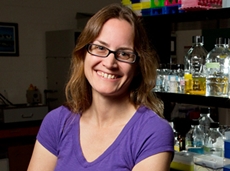Scientists aim to put a pox on dog cancer
13 Sep 2012
Researchers report that myxoma – a pox virus that afflicts rabbits but not humans, dogs or any other vertebrates so far studied – infects several different types of canine cancer cells in cell culture while sparing healthy cells. The study adds to the evidence that viruses or modified viruses will emerge as relatively benign cancer treatments to complement or replace standard cancer therapies.
 |
| Illinois veterinarian and pathobiology professor Amy MacNeill and her colleagues discovered that an altered myxoma virus infects and kills dog cancer cells but not healthy cells in cell culture. Photo by L. Brian Stauffer |
The new study, reported in the American Journal of Veterinary Research, is unique in that it focused on spontaneously occurring cancers in dogs. This allowed the researchers to avoid a common practice - testing viral therapies on mice or rats with induced human cancers.
Such animals must be immunosuppressed to prevent their immune systems from rejecting the foreign tissue, complicating the results.
Treating cancers with viruses could offer several advantages over standard cancer therapies, said University of Illinois veterinarian and pathobiology professor Amy MacNeill, who led the new study. Many cancers have impaired anti-viral defenses, which allow viruses to target tumours while sparing healthy cells. And under the right conditions, infection with an oncolytic (cancer-killing) virus exterminates cancer cells and elicits an anti-cancer immune response without spurring a harmful inflammatory response, she said. Chemotherapy and radiation kill healthy cells along with cancer cells and radiation can cause abrupt cell death that spurs inflammation and pain, she said.
''Ideally, what would happen is the virus would get into a few cancer cells, cause cell death and then spread to the other tumor cells nearby,'' she said.
Recent studies have shown that oncolytic viral therapies can be used successfully in conjunction with traditional approaches, MacNeill said.


















